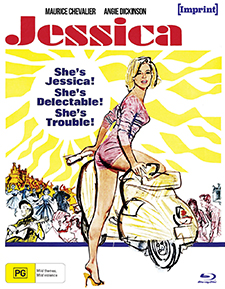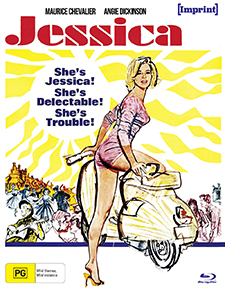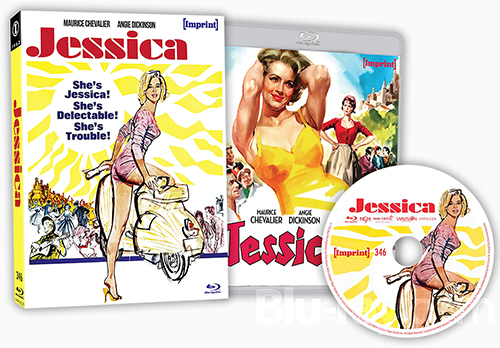Jessica (Blu-ray Review)

Director
Jean NegulescoRelease Date(s)
1962 (August 28, 2024)Studio(s)
Dear Film Produzione/Les Films Ariane/United Artists (Imprint Films/Via Vision Entertainment)- Film/Program Grade: B
- Video Grade: B
- Audio Grade: B-
- Extras Grade: B+
Review
[Editor’s Note: This is a Region-Free Australian Blu-ray import release.]
A French-Italian-U.S. co-production, Jessica (1962), a comedy-drama about a hot, recently widowed American midwife (Angie Dickinson) turning a Sicilian village upside-down with jealous wives, hot-blooded husbands, etc. is anything but your typical Hollywood comedy: an American director shooting in Italy with American, Italian, and French actors all performing in English. The film is both adult for its time while also quite conservative about gender roles, it’s ingratiating and innocuous, but a little protracted and ultimately sentimental, but a lot of it works. It’s something like a missing link between Julien Duvivier’s The Little World of Don Camillo (1952), with Fernandel, and Stanley Kramer’s The Secret of Santa Vittoria (1969) with Anthony Quinn, both colorful, warm-hearted comedies about close-knit Italian rural communities.
In Jessica, top-billed Maurice Chevalier plays Father Antonio, speaking directly to the camera and occasionally singing much like his character in Gigi (1958). Through his title song the story gets set-up: nurse Jessica, widowed on her honeymoon, decides to stay in Sicily, working as a midwife in Forza d’Agrò. Flirtatious to a point, riding around the village on her Piaggio Vespa, looking sexy, the attentive, lusting men cause grave concern among the women of the village, even though Jessica’s personal policy is to never get involved with a married or otherwise attached man.
The women, led mainly by widowed matriarch Maria Lombardo (Agnes Moorehead), taking a page from the Greek play Lysistrata (the screenplay itself adapted from Flora Sundström’s novel), along with about-to-be-married Nicolina (Danielle De Metz), conspire to withhold sex so that no babies will be born, thus eliminating any need for a midwife.
Meanwhile, Jessica becomes romantically involved with Edmondo Raumo (Gabrieile Ferzetti), a wealthy but reclusive marchese and best of friends with elderly, sickly gardener, Old Crupi (Noël-Noël), also the uncle of Gianni (Antonio Cifariello), Nicolina’s betrothed.
Like the sumptuous locations in Billy Wilder’s Avanti! (1972), the beauty of the Italian scenery throughout Jessica elicits the same kind of reaction—Hey, I could retire there. It’s a pretty film to look at. The story is, for 1962 American audiences, adult with its sorta-open discussions about withholding sex, and the burning desires that result, but it’s also quite conservative in its Catholic views that women shouldn’t deny their husbands and instead should obey them and crank out babies. A very dated running gag, for instance, has one of the withholding wives repeatedly turning up with black eyes while some scenes try to squeeze laughs out of the concept that it’s only natural that husbands would brutally force themselves on their women.
Generally, though, Jessica has an easy-going, good-natured charm, Dickinson is very appealing, and some of honest sentiment comes through, especially in terms of the village’s sense of community, particularly at Nicolina’s wedding, and the vigil held for the dying Old Crupi.
What dampens the film’s charms are technical aspects original to the production, and some failings of the inadequate video master. Of the former, it’s the typically wacky ’60s jumble of American and European talent pretending here to be Sicilians but speaking English throughout: American Agnes Moorehead, French actors Chevalier, Noël-Noël, and Marcel Dalio (one-time croupier in Casablanca), beautiful Croatian Sylva Koscina (as Dalio’s wife), etc. Some, like Dalio, Kerima (the most suspicious of the wives), and De Metz (who gets an “and introducing credit,” despite her earlier roles in Return of the Fly and Valley of the Dragons) made movies in Hollywood and speak adequate English, others much less so. In the Italian manner, it appears the film was (at least mostly) shot silent and dubbed later, though most of the original actors’ voices are used.
Conversely, the video transfer, reportedly a 2K scan of the original negative, is well below par in several respects. Shot in 2.35:1 anamorphic Panavision, licensee MGM and Imprint apparently didn’t have access to first-rate film elements. The film, for the most part, has good color, but also its share of damage, including scratches, splices, and even blotches during Chevalier’s big musical number. The main feature is reasonably sharp, but the opening titles are a disaster, so blurry and grainy at once it’s hard to even read the credits. The 2.0 mono LPCM audio is no better. Partly it’s the dubbing process but overall it’s still much weaker than it needs to be. Visually and aurally, Jessica has the feel of a cheap Hercules movie. Optional English subtitles are provided on this Region-Free disc.
Two decent extras supplement the disc: a new audio commentary by film historian C. Courtney Joiner, and a nearly 47-minute documentary, Angie Dickinson: Looking Back, which seems new but which draws primarily from a career-length interview with the actress conducted 20 years ago, in 2004. Virtually no time is spent on Jessica itself, but it’s a fun featurette, with long sections devoted to Rio Bravo, her early film and TV work, and association with the Rat Pack. She’s a lively, fun interview subject.
Jessica is somewhat good, somewhat lackluster but it’s a valiant effort that succeeds part of the time, a real curio that’s worth a look.
- Stuart Galbraith IV


